Abstract
OBJECTIVES: The present study sought to formulate a precise definition of sedentarism and to identify activities performed by active people that could serve as effective preventive goals. METHODS: A population-based sample of 919 residents of Geneva, Switzerland, aged 35 to 74 years, completed a 24-hour recall. Sedentary people were defined as those expending less than 10% of their daily energy in the performance of moderate- and high-intensity activities (at least 4 times the basal metabolism rate). RESULTS: The rates of sedentarism were 79.5% in men and 87.2% in women. Among sedentary and active men, average daily energy expenditures were 2600 kcal (95% confidence interval [CI] = 2552, 2648) and 3226 kcal (95% CI = 3110, 3346), respectively; the corresponding averages for women were 2092 kcal (95% CI = 2064, 2120) and 2356 kcal (95% CI = 2274, 2440). The main moderate- and high-intensity activities among active people were sports (tennis, gymnastics, skiing), walking, climbing stairs, gardening, and (for men only) occupational activities. CONCLUSIONS: The definition of sedentarism outlined in this article can be reproduced in other populations, allows comparisons across studies, and provides preventive guidelines in that the activities most frequently performed by active people are the ones most likely to be adopted by their sedentary peers.
Full text
PDF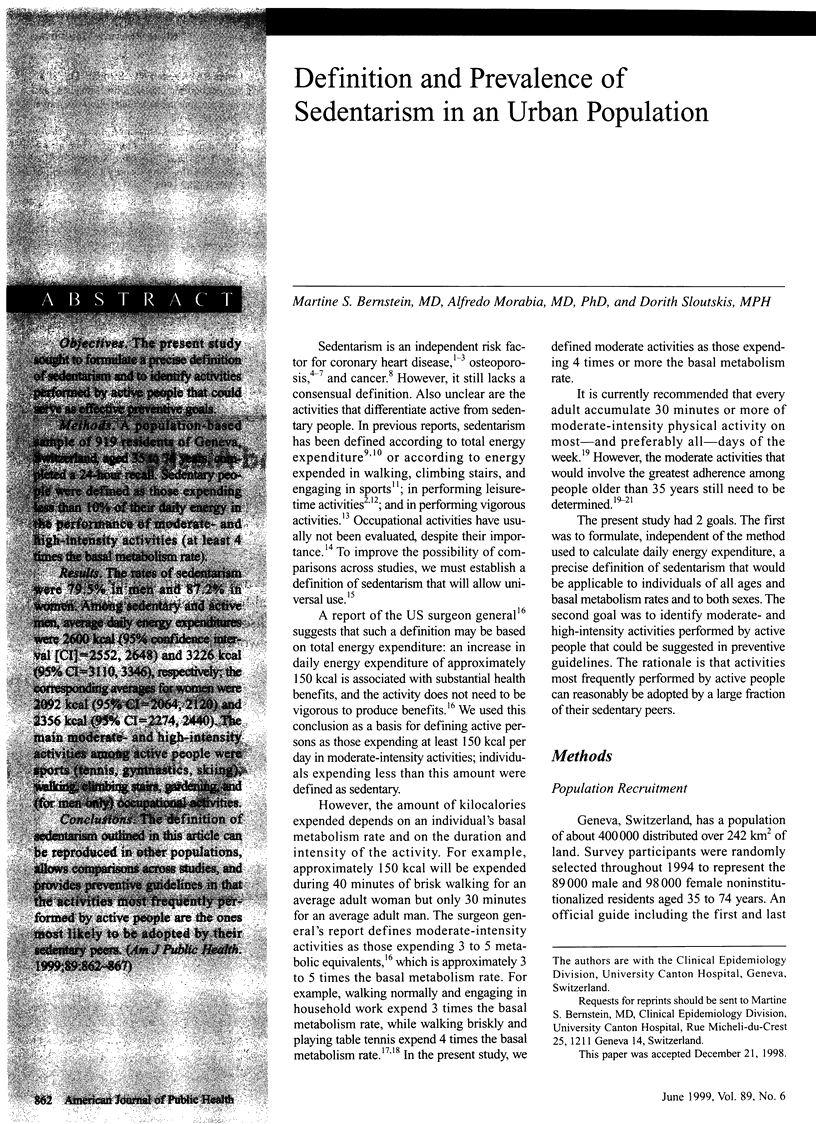
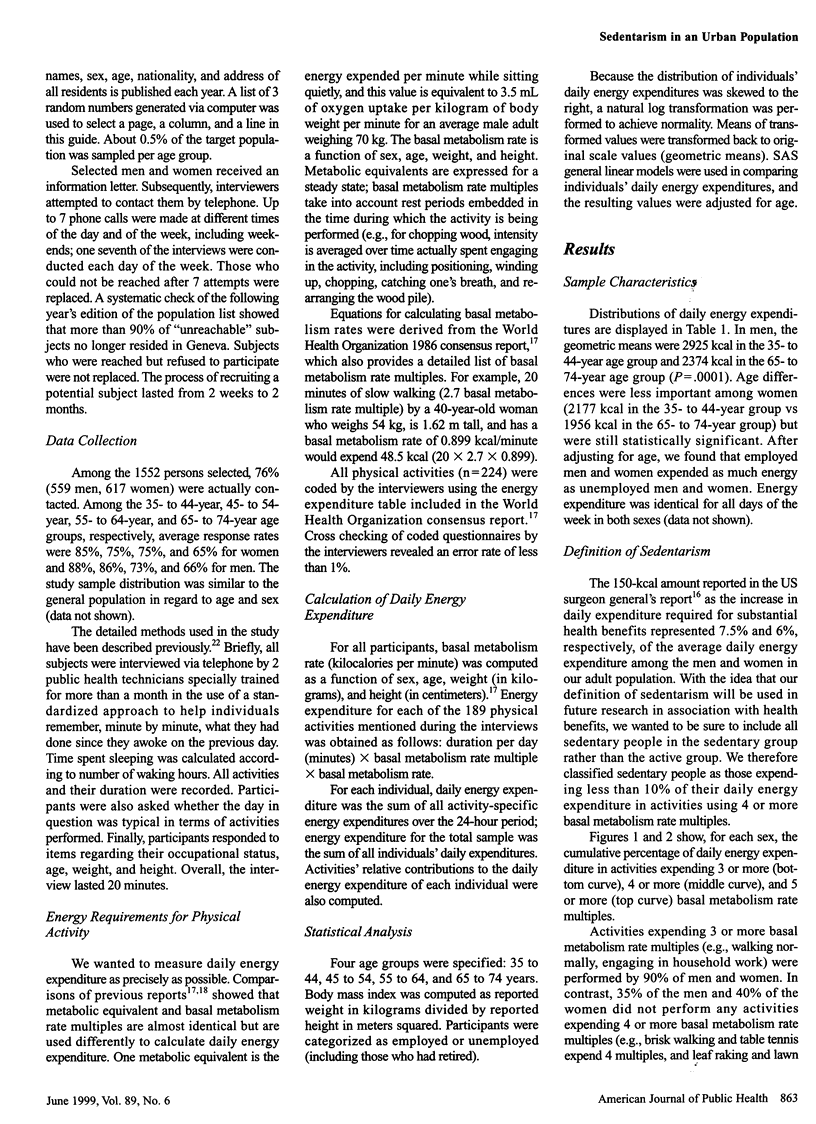
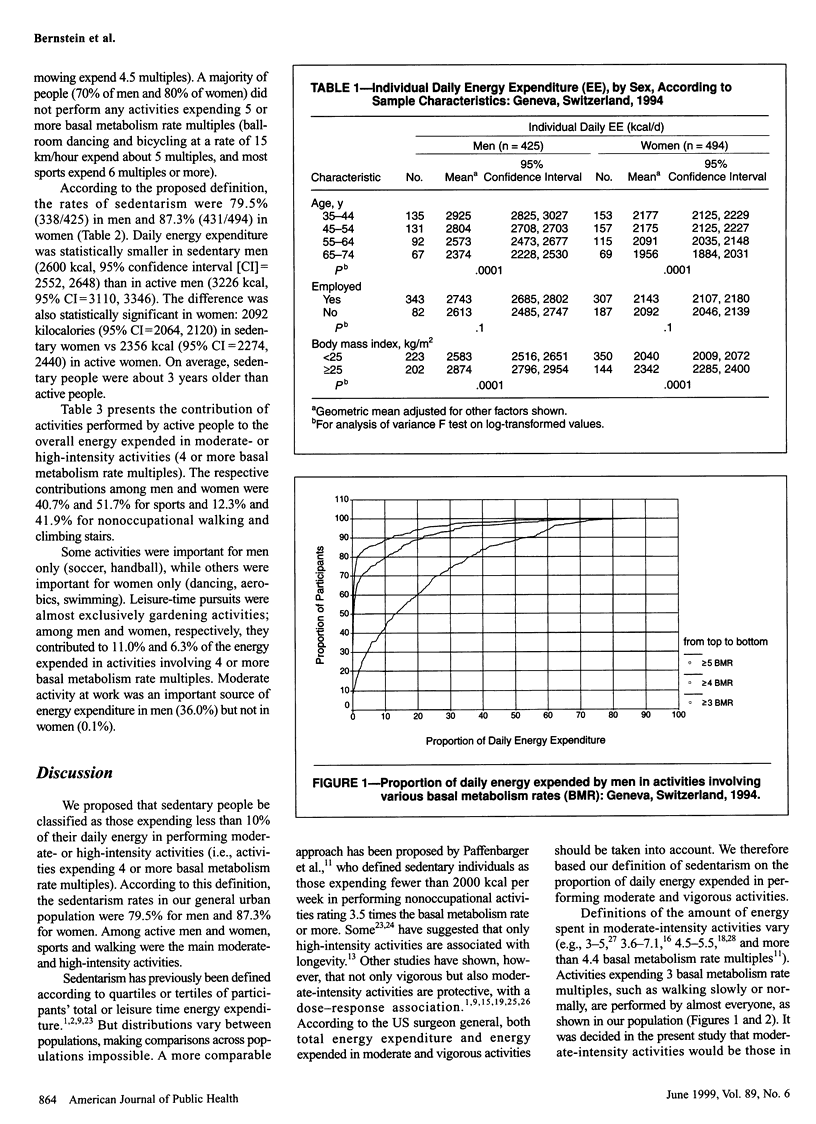
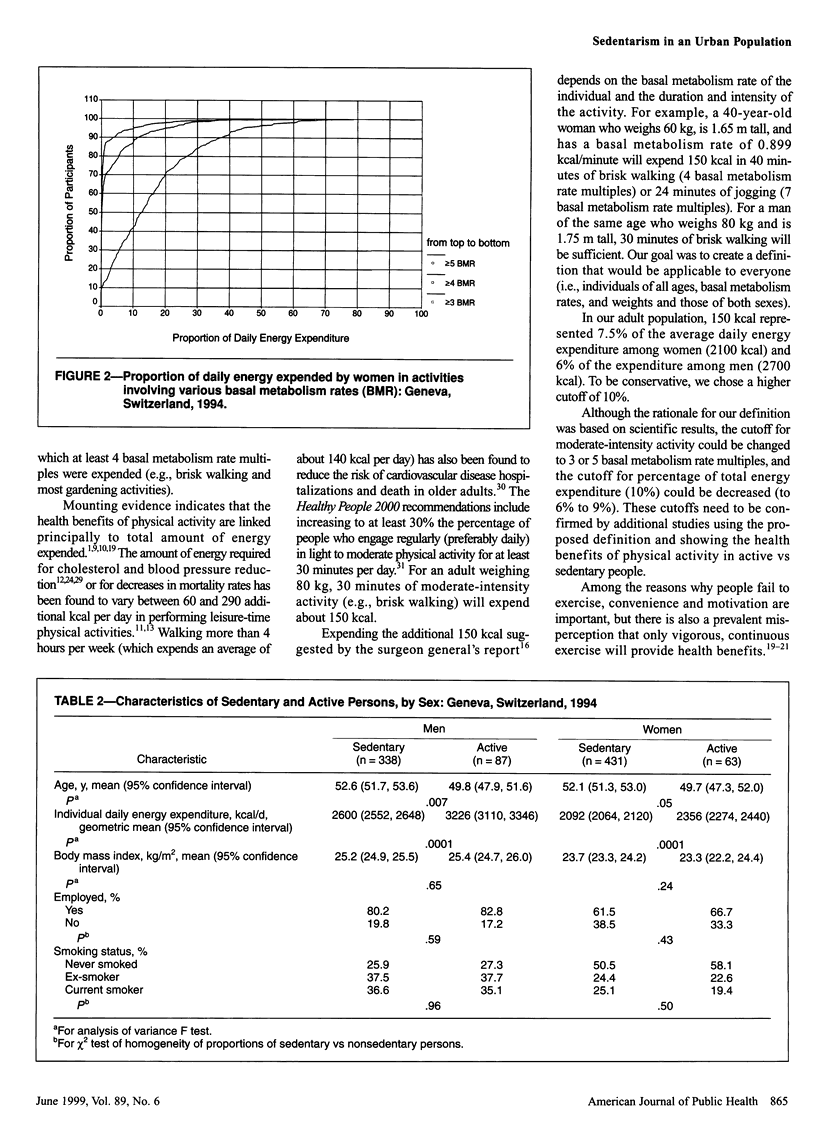
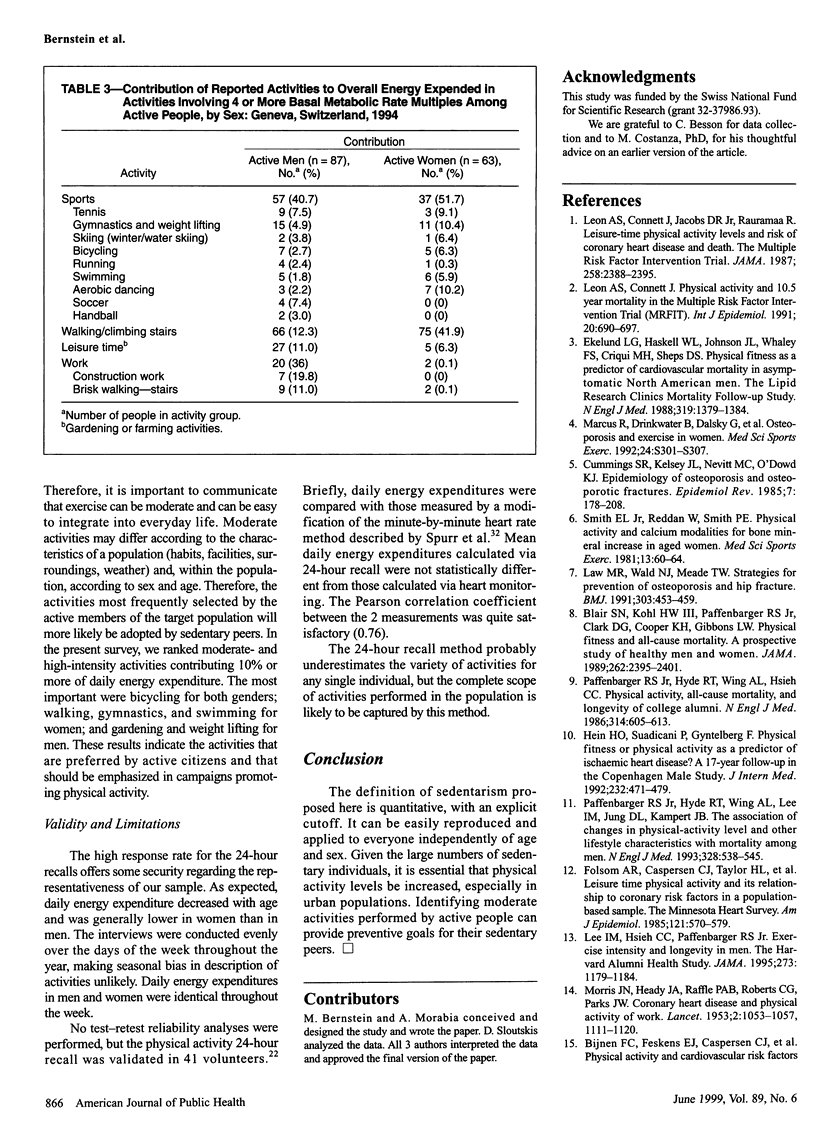
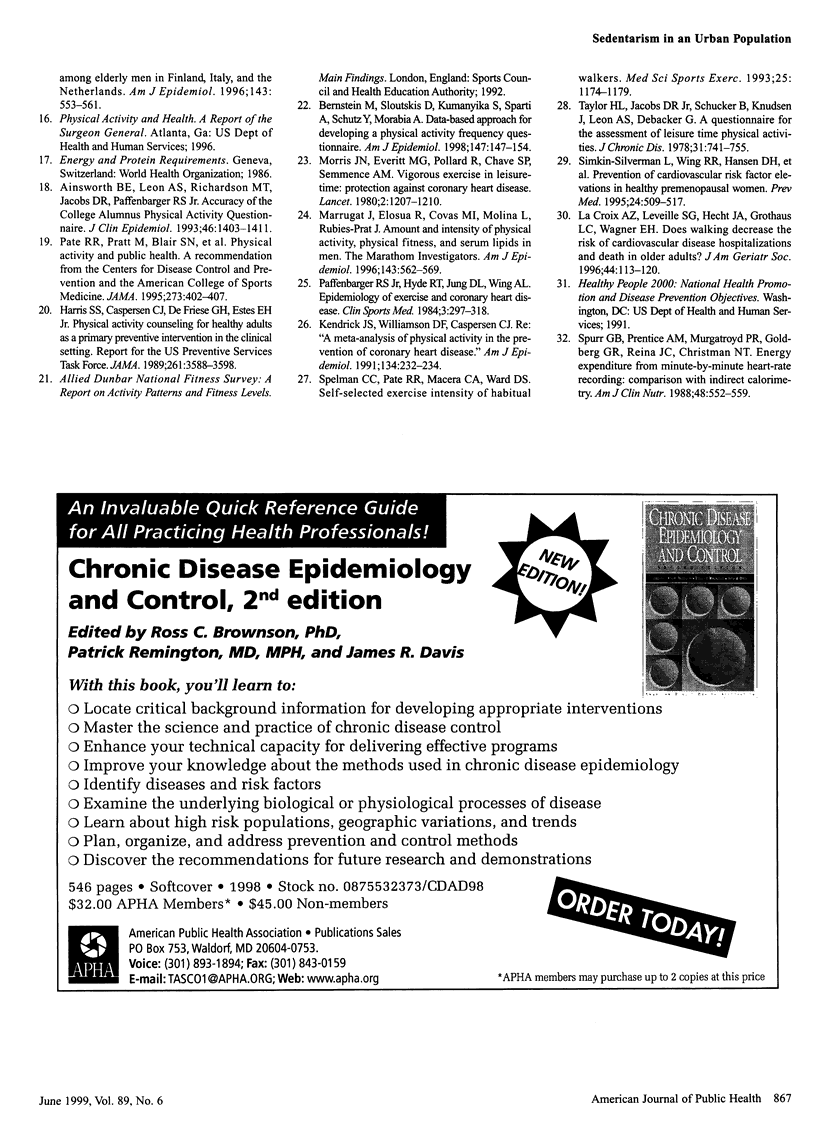
Selected References
These references are in PubMed. This may not be the complete list of references from this article.
- Ainsworth B. E., Leon A. S., Richardson M. T., Jacobs D. R., Paffenbarger R. S., Jr Accuracy of the College Alumnus Physical Activity Questionnaire. J Clin Epidemiol. 1993 Dec;46(12):1403–1411. doi: 10.1016/0895-4356(93)90140-v. [DOI] [PubMed] [Google Scholar]
- Bernstein M., Sloutskis D., Kumanyika S., Sparti A., Schutz Y., Morabia A. Data-based approach for developing a physical activity frequency questionnaire. Am J Epidemiol. 1998 Jan 15;147(2):147–154. doi: 10.1093/oxfordjournals.aje.a009427. [DOI] [PubMed] [Google Scholar]
- Blair S. N., Kohl H. W., 3rd, Paffenbarger R. S., Jr, Clark D. G., Cooper K. H., Gibbons L. W. Physical fitness and all-cause mortality. A prospective study of healthy men and women. JAMA. 1989 Nov 3;262(17):2395–2401. doi: 10.1001/jama.262.17.2395. [DOI] [PubMed] [Google Scholar]
- Cummings S. R., Kelsey J. L., Nevitt M. C., O'Dowd K. J. Epidemiology of osteoporosis and osteoporotic fractures. Epidemiol Rev. 1985;7:178–208. doi: 10.1093/oxfordjournals.epirev.a036281. [DOI] [PubMed] [Google Scholar]
- Ekelund L. G., Haskell W. L., Johnson J. L., Whaley F. S., Criqui M. H., Sheps D. S. Physical fitness as a predictor of cardiovascular mortality in asymptomatic North American men. The Lipid Research Clinics Mortality Follow-up Study. N Engl J Med. 1988 Nov 24;319(21):1379–1384. doi: 10.1056/NEJM198811243192104. [DOI] [PubMed] [Google Scholar]
- Folsom A. R., Caspersen C. J., Taylor H. L., Jacobs D. R., Jr, Luepker R. V., Gomez-Marin O., Gillum R. F., Blackburn H. Leisure time physical activity and its relationship to coronary risk factors in a population-based sample. The Minnesota Heart Survey. Am J Epidemiol. 1985 Apr;121(4):570–579. doi: 10.1093/oxfordjournals.aje.a114035. [DOI] [PubMed] [Google Scholar]
- Harris S. S., Caspersen C. J., DeFriese G. H., Estes E. H., Jr Physical activity counseling for healthy adults as a primary preventive intervention in the clinical setting. Report for the US Preventive Services Task Force. JAMA. 1989 Jun 23;261(24):3588–3598. [PubMed] [Google Scholar]
- Hein H. O., Suadicani P., Gyntelberg F. Physical fitness or physical activity as a predictor of ischaemic heart disease? A 17-year follow-up in the Copenhagen Male Study. J Intern Med. 1992 Dec;232(6):471–479. doi: 10.1111/j.1365-2796.1992.tb00619.x. [DOI] [PubMed] [Google Scholar]
- Kendrick J. S., Williamson D. F., Caspersen C. J. Re: "A meta-analysis of physical activity in the prevention of coronary heart disease". Am J Epidemiol. 1991 Jul 15;134(2):232–234. doi: 10.1093/oxfordjournals.aje.a116075. [DOI] [PubMed] [Google Scholar]
- LaCroix A. Z., Leveille S. G., Hecht J. A., Grothaus L. C., Wagner E. H. Does walking decrease the risk of cardiovascular disease hospitalizations and death in older adults? J Am Geriatr Soc. 1996 Feb;44(2):113–120. doi: 10.1111/j.1532-5415.1996.tb02425.x. [DOI] [PubMed] [Google Scholar]
- Law M. R., Wald N. J., Meade T. W. Strategies for prevention of osteoporosis and hip fracture. BMJ. 1991 Aug 24;303(6800):453–459. doi: 10.1136/bmj.303.6800.453. [DOI] [PMC free article] [PubMed] [Google Scholar]
- Lee I. M., Hsieh C. C., Paffenbarger R. S., Jr Exercise intensity and longevity in men. The Harvard Alumni Health Study. JAMA. 1995 Apr 19;273(15):1179–1184. [PubMed] [Google Scholar]
- Leon A. S., Connett J., Jacobs D. R., Jr, Rauramaa R. Leisure-time physical activity levels and risk of coronary heart disease and death. The Multiple Risk Factor Intervention Trial. JAMA. 1987 Nov 6;258(17):2388–2395. [PubMed] [Google Scholar]
- Leon A. S., Connett J. Physical activity and 10.5 year mortality in the Multiple Risk Factor Intervention Trial (MRFIT). Int J Epidemiol. 1991 Sep;20(3):690–697. doi: 10.1093/ije/20.3.690. [DOI] [PubMed] [Google Scholar]
- MORRIS J. N., HEADY J. A., RAFFLE P. A., ROBERTS C. G., PARKS J. W. Coronary heart-disease and physical activity of work. Lancet. 1953 Nov 21;265(6795):1053–contd. doi: 10.1016/s0140-6736(53)90665-5. [DOI] [PubMed] [Google Scholar]
- Marcus R., Drinkwater B., Dalsky G., Dufek J., Raab D., Slemenda C., Snow-Harter C. Osteoporosis and exercise in women. Med Sci Sports Exerc. 1992 Jun;24(6 Suppl):S301–S307. doi: 10.1249/00005768-199206001-00013. [DOI] [PubMed] [Google Scholar]
- Marrugat J., Elosua R., Covas M. I., Molina L., Rubiés-Prat J. Amount and intensity of physical activity, physical fitness, and serum lipids in men. The MARATHOM Investigators. Am J Epidemiol. 1996 Mar 15;143(6):562–569. doi: 10.1093/oxfordjournals.aje.a008786. [DOI] [PubMed] [Google Scholar]
- Morris J. N., Everitt M. G., Pollard R., Chave S. P., Semmence A. M. Vigorous exercise in leisure-time: protection against coronary heart disease. Lancet. 1980 Dec 6;2(8206):1207–1210. doi: 10.1016/s0140-6736(80)92476-9. [DOI] [PubMed] [Google Scholar]
- Paffenbarger R. S., Jr, Hyde R. T., Jung D. L., Wing A. L. Epidemiology of exercise and coronary heart disease. Clin Sports Med. 1984 Apr;3(2):297–318. [PubMed] [Google Scholar]
- Paffenbarger R. S., Jr, Hyde R. T., Wing A. L., Hsieh C. C. Physical activity, all-cause mortality, and longevity of college alumni. N Engl J Med. 1986 Mar 6;314(10):605–613. doi: 10.1056/NEJM198603063141003. [DOI] [PubMed] [Google Scholar]
- Paffenbarger R. S., Jr, Hyde R. T., Wing A. L., Lee I. M., Jung D. L., Kampert J. B. The association of changes in physical-activity level and other lifestyle characteristics with mortality among men. N Engl J Med. 1993 Feb 25;328(8):538–545. doi: 10.1056/NEJM199302253280804. [DOI] [PubMed] [Google Scholar]
- Pate R. R., Pratt M., Blair S. N., Haskell W. L., Macera C. A., Bouchard C., Buchner D., Ettinger W., Heath G. W., King A. C. Physical activity and public health. A recommendation from the Centers for Disease Control and Prevention and the American College of Sports Medicine. JAMA. 1995 Feb 1;273(5):402–407. doi: 10.1001/jama.273.5.402. [DOI] [PubMed] [Google Scholar]
- Simkin-Silverman L., Wing R. R., Hansen D. H., Klem M. L., Pasagian-Macaulay A. P., Meilahn E. N., Kuller L. H. Prevention of cardiovascular risk factor elevations in healthy premenopausal women. Prev Med. 1995 Sep;24(5):509–517. doi: 10.1006/pmed.1995.1081. [DOI] [PubMed] [Google Scholar]
- Smith E. L., Jr, Reddan W., Smith P. E. Physical activity and calcium modalities for bone mineral increase in aged women. Med Sci Sports Exerc. 1981;13(1):60–64. [PubMed] [Google Scholar]
- Spelman C. C., Pate R. R., Macera C. A., Ward D. S. Self-selected exercise intensity of habitual walkers. Med Sci Sports Exerc. 1993 Oct;25(10):1174–1179. [PubMed] [Google Scholar]
- Spurr G. B., Prentice A. M., Murgatroyd P. R., Goldberg G. R., Reina J. C., Christman N. T. Energy expenditure from minute-by-minute heart-rate recording: comparison with indirect calorimetry. Am J Clin Nutr. 1988 Sep;48(3):552–559. doi: 10.1093/ajcn/48.3.552. [DOI] [PubMed] [Google Scholar]
- Taylor H. L., Jacobs D. R., Jr, Schucker B., Knudsen J., Leon A. S., Debacker G. A questionnaire for the assessment of leisure time physical activities. J Chronic Dis. 1978;31(12):741–755. doi: 10.1016/0021-9681(78)90058-9. [DOI] [PubMed] [Google Scholar]


